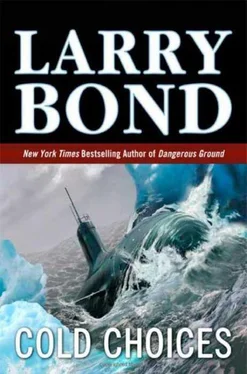“All right, then. You have your assigned duties, comrades, please carry them out with all due diligence. I will await your reports. Dismissed.”
Petrov escorted the now-splinted Kalinin up to the central post, where his starpom started to put the watch rotation schedule into effect. Tired and very sore, Petrov walked over to the sonar post and sat down in one of the chairs. It would take his officers a little time to compile the detailed reports, and he just wanted to be off his feet for a minute or two.
An hour later, Kalinin woke him up with the reports in his hands. His demeanor spoke of more bad news. Petrov thanked his first officer and started to read the reports in the dim light.
Dr. Balanov’s report was first. Seven crewmen were known dead, with nine missing and presumed to be dead. There were eighteen men with moderate or serious injuries; two were in critical condition, and in the doctor’s professional opinion probably would not survive another day. And then there was Sadilenko’s mental state. Virtually everyone else had some minor injuries of one form or another.
Petrov did the math in his head. Thirty-five men, well over a third of his crew, were dead or badly hurt. A stiff price to pay for his folly.
Fonarin’s report was worse. They only had fifty-eight V-64 cassettes for the chemical air-regeneration units. They’d left port with only an eighty percent loadout and many cassettes had been lost in compartments one, seven, and eight. With sixty-nine men still alive, they only had three days’ worth of chemicals. The only good news was that there was adequate electrical power in the reserve battery to run the blowers in the regeneration units for up to six days.
Given their resources and the number of men, Fonarin and Balanov recommended maintaining oxygen at seventeen percent and carbon dioxide at one percent. Dr. Balanov articulated the medical effects of this atmospheric composition, and it was clear they would all be suffering from nasty headaches and fatigue.
Petrov placed the reports on the dead sonar console, his head already throbbing. His thoughts were drawn back to the list of the dead and missing. Sixteen men gone because of him.
No wait, it was likely more than that. He hadn’t even thought about the American submarine. Were they on the bottom, struggling to survive? Or were they already dead? He remembered that U.S. submarine designers didn’t emphasize survivability like the Russian Navy.
And then he thought of the half-truth he had told his officers. It was true the emergency distress buoy had deployed, but he didn’t know if it reached the surface, or that its message actually was sent and received by the Northern Fleet Headquarters. Could all of the measures they were preparing to take be pointless? Were they all doomed to die a slow and painful death from carbon dioxide poisoning?
And why? Just because he couldn’t let go of the American after he had beaten him. Suddenly, the words of advice from Vice Admiral Kokurin jumped up from his memory: “Aggressiveness can be a blessing or a curse. If it is not tempered by wisdom, it will lead to recklessness. And that can have unfortunate consequences. Be my wolfhound, but don’t be a rabid one.”
A cold sweat broke out on Petrov’s brow as he realized he had become rabid during the heat of the hunt. He’d lost control and let emotion replace reason. The loss of sixteen men, and perhaps as many as two hundred, weighed heavily on Petrov’s conscience. And there in the dark, cold and alone, Petrov wept.
While the storm raged above them, Seawolf crept westward at the stately speed of four knots. With the bow ripped apart, they really couldn’t go faster without something loose banging away. If they were going to leave quietly, this was the best they could do. Unfortunately, at this rate it would take them nearly five days just to get out of the Barents Sea. It was going to be a very long trip to Faslane.
Anxious to reestablish a routine underway schedule, Shimko encouraged his department heads to gently push a sense of normalcy. Jerry wholeheartedly agreed with the XO’s plan, but he had reservations. Without the skipper, it wasn’t going to fly with the rest of the crew.
Like a symphony conductor, a commanding officer sets the tone and tempo for his command. A good one can meld the various personalities of his crew into a cohesive group that works together in harmony. Without proper direction, the well-meaning efforts of individuals can work at cross-purposes with each other, generating a fair number of sour notes.
Commander Thomas Rudel was a master conductor. He had shaped the crew of Seawolf into such a well-oiled machine that they believed there was nothing they couldn’t do. He was the quiet motivating force behind the scenes. Without his direct personal involvement, it would be nearly impossible to reestablish anything close to normal on board the boat.
Jerry usually ate dinner at the first sitting, along with the rest of the senior officers. It wasn’t so much a class prerogative as a chance for Seawolf’s leadership to sit down together. It was amazing how hard it could be to find time for a simple meeting on such a small vessel.
He had heard the supply officer tell the cooks to put on a really good dinner. Constantino knew how important food was to the crew’s morale, and he was playing that card for all it was worth. Besides, Seawolf would be going into the yards as soon as they returned home. Anything they didn’t eat would have to be offloaded. Knowing it was a way they could help, the cooks had worked flat-out, creating a meal that was memorable without being celebratory: fried chicken, mashed potatoes and gravy, greens, fresh biscuits, and three kinds of pie for dessert, including Dutch apple pie, the skipper’s favorite.
But Captain Rudel wasn’t there. The XO sat in his place, and diverted any questions about the captain by asking his own questions — about the crew or the boat. After a few exchanges of question and counterquestion, they figured out that Shimko wasn’t going to budge. The officers shifted their thoughts toward sharing their experiences during the collision. Stories almost bubbled out of the diners, but the discussion quickly turned to the most important topic: the Russian’s identity and purpose.
Shimko didn’t have to tell the others about Senior Chief Carpenter’s information. It’s very hard to keep a secret on a submarine, and the identity of the Russian attack sub had spread like wildfire throughout the crew. Seawolf’s own sonar techs had come to the same conclusion on the sub’s identity. It was a Russian nuclear attack boat, but one that didn’t match anything in the database — Q.E.D. Severodvinsk. The name Severodvinsk now echoed off the bulkheads in discussions all over Seawolf, as if it were some mystical creature.
“But what was he doing?” Greg Wolfe was the third to ask the question, but nobody had an answer. Lieutenant Commander Stan Lavoie described the Russian’s movements, and the XO confirmed his account. Lieutenant (j.g.) McClelland told the others what the sonar gang knew about the Russian’s sonar lashing, and there was general consensus that the Russian was “certifiable.”
But the Russians didn’t put lunatics in command of nuclear submarines. He’d certainly disrupted their survey. “Could he have been trying to ram the UUV?” asked Wolfe.
Shimko quickly shook his head, chewing. He swallowed and said, “His aim couldn’t have been that bad. His mine-hunting sonar would see it. That’s a precision set, accurate to within a couple of yards. He was a lot closer to us than to LaVerne.”
Everyone at the table agreed that the Russian had “conclusively won” the encounter by disrupting their survey. “But he disrupted our operations the instant he announced his presence,” Jerry said. “He didn’t need to run circles around us.”
Читать дальше












